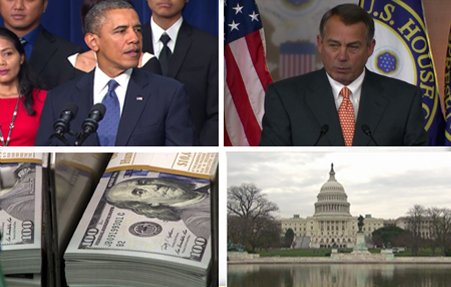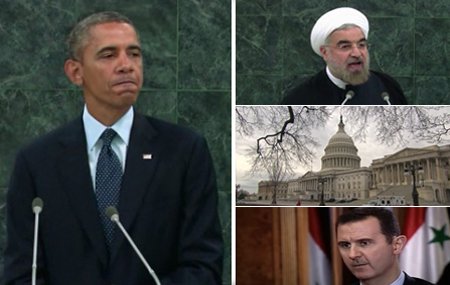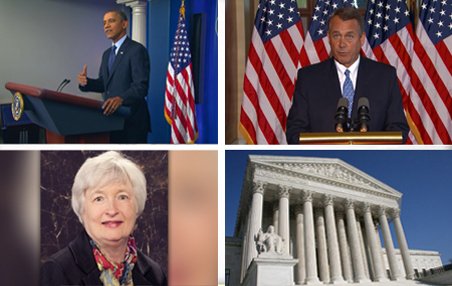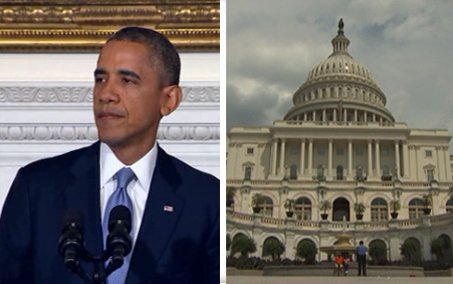The shutdown standoff continues between President Obama and congressional republicans as the debt ceiling crisis looms, an estimated 800,000 federal government workers nationwide have been put on furlough, and the new online health insurance exchanges open for business. Joining Gwen: Dan Balz, Washington Post; John Dickerson, Slate Magazine; Molly Ball, The Atlantic; John Harwood, CNBC and The New
GWEN IFILL: The government shuts down, the health care law revs up. Is Washington broken or is this how it’s supposed to work, tonight on “Washington Week.”
REPRESENTATIVE JOHN BOEHNER (R-OH) [Speaker of the House]: (From tape.) This isn’t some damn game. The American people don’t want their government shut down and neither do I.
MS. IFILL: As tensions rise, so does the rhetoric.
PRESIDENT BARACK OBAMA: (From tape.) The American people are not pawns in some political game. You don’t get to demand some ransom in exchange for keeping the government running.
MS. IFILL: Poisons run deep in Washington as the government shutdown prepares to enter its second week.
REPRESENTATIVE NANCY PELOSI (D-CA) [House Minority Leader]: (From tape.) It’s pathetic. It’s not responsible. It’s beneath the dignity. I keep saying that, but we keep getting further beneath the dignity.
REPRESENTATIVE TED POE (R-TX): (From tape.) The president will negotiate with the Iranians. The president will negotiate with the Russians about Syria. But the president and the Senate will not talk to the House.
MS. IFILL: Meanwhile, the national health care law everybody is fighting about kicks into high gear with a few problems.
MAN: (From tape.) My advice to the American people is, buyer beware.
SENATOR HARRY REID (D-NV) [Senate Majority Leader]: (From tape.) It’s time for Republicans to stop obsessing over old battles. I mean, I say to my Republican friends, “Obamacare” is over. It’s past. It’s the law.
MS. IFILL: Will Washington dysfunction cripple the economy or save the country from a bad idea?
Covering the week: Molly Ball of the Atlantic, Dan Balz of the Washington Post, John Dickerson of Slate Magazine and CBS News, and John Harwood of CNBC and the New York Times.
ANNOUNCER: Award-winning reporting and analysis, covering history as it happens, live from our nation’s capital this is “Washington Week with Gwen Ifill.”
(Station announcements.)
ANNOUNCER: Once again, live from Washington, moderator Gwen Ifill.
MS. IFILL: Good evening. Suffice it to say, Washington has not exactly covered itself with glory this week. Many of its elected representatives are not speaking to each other. Eight hundred thousand government employees have been sidelined without pay, shuttering museums, national parks, and Head Start programs. And an ambitious new national health care program was launched with great fanfare only to get bogged down in days of technical glitches.
Right about now, you’re probably wondering, has your federal government gone permanently off the rails? Here’s what two House lawmakers, one a Democrat, one a Republican, had to say this week.
REPRESENTATIVE MARK POCAN (R-WI): (From tape.) I feel like I’m serving in the nation’s largest kindergarten, only we’re in charge of the federal checkbook and the nuclear arsenal.
REPRESENTATIVE CHARLIE DENT (R-PA): (From tape.) We’re all tired of the brinksmanship and the showmanship and all the drama and the theatrics. And we want to get on with the business of governing. We have a responsibility to govern. We have to do better.
MS. IFILL: The president today opted for symbolism, taking a lunchtime stroll with Vice President Biden to a Pennsylvania Avenue sandwich shop that’s giving discounts to furloughed federal employees.
PRESIDENT OBAMA: (From tape.) This shutdown could be over today. We know there are the votes for it in the House of Representatives. And, as I said yesterday, if Speaker Boehner will simply allow that vote to take place, we could end this shutdown.
MS. IFILL: Mr. Boehner begs to disagree.
REP. BOEHNER: (From tape.) All we’re asking for is to sit down and have a discussion and to bring fairness – reopen the government and bring fairness to the American people under “Obamacare.” It’s as simple as that.
MS. IFILL: But the truth is everything is frozen right now in Washington; no negotiations underway, no end in sight. What’s the state of play, John?
JOHN DICKERSON: Well, the state of play is a total standstill right now. I mean, just to review, we have these two crises. We have the government funding crisis, which we’re now in the middle of. The president had to cancel his trip to Asia. He truncated it but now it’s cancelled; cancer patients are not getting seen; women on relief, nine million of them not getting their money.
Then there’s this debt limit fight. And these used to be two separate issues. Now they’re basically rolled into one, at least that’s the way that the House Republicans are thinking about it.
And so they’re trying to come up with a way to get some concessions out of the president, some spending concessions, some reductions in spending in return for raising the debt limit. And the president’s answer is basically, nuts to you. You’ve got to raise the debt limit and no conditions at all. And so the House Republicans are saying, we have no one to talk to. So that’s kind of where we are – we stand at the moment. Now, that’s a very dire looking picture. But there is one –
MS. IFILL: No kidding.
MR. DICKERSON: There is one sort of happy pasture they could all get to based on some conversations I had tonight. And that, it goes this way, which is that John Boehner, Speaker Boehner, talks to Harry Reid, the Democratic leader in the Senate, and says, OK, we will have a clean debt limit increase. That’s what the president wants. And then we will have an agreement when we do that to get – have a binding agreement to enter into some negotiations, which we will discuss a number of things. We’ll discuss entitlements; we’ll discuss tax reform, a whole bunch of things to get some savings out of the budget. Now, they will say these two things aren’t linked, but they will be linked, and that, as one staffer put it on the Republican side, that way everybody is clean and everybody is dirty.
MS. IFILL: But why up until – maybe that – maybe that will happen. I don’t know. We’ve seen lots of things get started that never come to anything. But, Dan, why to this point have there not been negotiations? Do Republicans have a point that the president is refusing to negotiate?
DAN BALZ: Well, the president’s position has been hard and firm, which is that this is a shutdown entirely of the making of a faction of the Republican conference, the most conservative part of the Republican conference in the House, which has, in their estimation, forced John Boehner to take this path, to try a series of things to do something to the president’s health care law, defund it, delay it, block it in some way. And they’ve taken a firm line that they’re simply not going to talk under those circumstances. And so you’ve – you know, you just have this impasse unlike almost anything we’ve seen.
MS. IFILL: Let’s see – let’s listen to a bit of that firm line, this coming from Senator Marco Rubio, senator from Florida with presidential ambitions. This is what he had to say.
SENATOR MARCO RUBIO (R-FL): (From tape.) I think it’s wrong too, by the way, that the president has used the megaphone of the presidency not to bring Americans together, but he’s used the megaphone to deepen these divisions. I just – you know, Mr. President, you’re not the chairman of the Democratic Party. You’re the president of the United States.
MS. IFILL: John, you talked to the president this week in an interview at the White House. Does he hear that kind of criticism or does it just – (off mic)?
JOHN HARWOOD: Well, no. I don’t think he accepts that kind of criticism at all. But just to go back to the question you posed to Dan, do Republicans have a point? Telling the truth requires that we say, no, they don’t have a point. Their position is not defensible. Let’s just review the bidding for a minute.
MS. IFILL: OK.
MR. HARWOOD: You had a – after the 2012 election, the speaker said, I’m not negotiating with the president anymore. They demanded that the Senate pass a budget. The Senate did pass the budget. House passed the budget. Do we have a conference committee? No.
What actually happened on spending was that Republicans, with the sequester levels that they insisted on, began trying to pass spending bills at those levels and would not do it because Republicans thought they were too low. There was no spending conversation.
They latched on to the “Obamacare” issue and demanded of the president – agreed to defund “Obamacare” and will open the government and will raise the debt limit, which is not far from saying, Mr. President, we’ll keep the government open and we’ll raise the debt limit if you resign. And then, when he says, no, then they say, OK. We’ll compromise. Resign a year from now. And then, when that’s rejected, they say, OK. How about a week early? And now they’re just looking for anything. They’re opening a conversation on spending in the budget that did not exist.
MS. IFILL: Except that there has been some change in some of the strategy. For instance, at first, Molly, they were talking about repealing the health care plan. Then they turned into taking the money away, starving it to death, defunding the health care plan. Now, today, at least the last we heard, the conversation was about delaying it. Isn’t that a slow back-away?
MOLLY BALL: Sure. From the point of view of the sort of tea party grassroots – and let’s not forget, that’s who pushed them to this point. It was their constituents. It was these – a lot of outside groups on the right that really pushed this idea of defunding.
From their point of view, they have made concessions, but the problem is, as John is saying, they started out with demand that was not even on anybody’s radar that even most Republicans had dismissed as outlandish until they sort of got put under pressure.
I mean, part of the Reason that Republicans are squirming so much right now is because they know they’re up against a wall. They don’t have any good options. And so they’re trying to turn the politics of this around because they don’t have a strategy legislatively. They don’t have a plan. They don’t know what they want. They don’t know what they would ask for if they got in that room with the president and he did agree to negotiate.
MS. IFILL: Go ahead, John.
MR. DICKERSON: Here’s the way that politics they think are going to shift in their favor. As John outlined, the country buys John’s analysis, which is to say when you ask people before this shutdown, should the defunding of the president’s health care plan be tied to the continued funding of the government? In five separate polls, there was vast opposition to this idea, huge opposition to this. The Republicans went ahead with their strategy anyway.
Then in polls since that – CBS had a poll out this week – 72 percent of the people polled said this is a bad idea. But if you then ask people, should there be some spending reductions associated with and tied to the debt limit increase, the numbers change.
The president’s view, which is that you should have a debt limit increase that’s totally clean, with no additional spending reductions tied to it, gets less than 20 percent support from the country. What Republicans hope is they can get over to that other place where their position, which is spending cuts associated with the debt limit increase, is more popular. The problem is Republicans explained it to me in the Senate is there’s been this cul-de-sac we’ve gone down, where we’ve got this fight over “Obamacare” we’re going to lose – that’s what the country is seeing. They’re not hearing our argument over here.
MR. HARWOOD: And that’s the point. The place where Republicans are on firmer ground, where you can have a reasonable conversation, where they have a strong position, they have not been waging that argument. That’s not where they’ve been.
MS. IFILL: Are the Democrats, Dan, just – it’s weird to have the Democrats in lockstep for a change and have the Republicans be the ones fighting among themselves. Are they just happy to step back and let this thing work itself out?
MR. BALZ: Well, they’re frustrated, but they don’t see any advantage at this point to try to do anything to help the Republicans out of this moment. And as both Johns have indicated –
MS. IFILL: Both Johns. I like that very much. Yeah.
MR. BALZ: The Republicans look at public opinion and see things that they think are on their side, that a majority of Americans dislike the Health Care Act and that a majority of Americans think the government spends too much money and there ought to be something done about that. Where they made their mistake, I think, is in trying to tie to some things that are in a sense unrelated to that.
MS. IFILL: As a matter of fact, the Health Care Act launched into full flower this week with the beginning of the exchanges.
MR. HARWOOD: For better or worse.
MS. IFILL: For better or worse.
MR. DICKERSON: Yeah. I should the flower’s kind of had one petal that’s kind of (droopy ?).
MS. IFILL: Yeah. This is true. But that said, did anybody get any closer in all of this to shutting it down? That’s not happening.
MS. BALL: No. I think the only way you could see that – you know, a lot of Republicans who have been against this idea of trying to defund “Obamacare,” they say, if “Obamacare” is such a disaster, it will collapse under its own weight. You know, the Republicans who are sort of cackling gleefully at the problems that have been had with this initial rollout, and particularly on the federal level, the federal exchange has been something of a disaster. We don’t know of a single person who successfully purchased insurance there. The smarter thing for the Republicans to have done might have been to just let the disaster happen and then they would have a stronger case. But instead, they’re stuck in this blind alley.
MR. HARWOOD: And one thing I think is important to point out, when you talk about the popularity or lack of it of “Obamacare” in the United States, you’ve got to talk about which America.
I looked at NBC/Wall Street Journal polls on this by race. “Obamacare” by two to one whites say is a bad idea. By three to one, African-Americans say it’s a good idea. Hispanics like it as well. So you have a big divide between people who think they may be paying for something that is not going to benefit them and people who think it is going to benefit them. And it’s no accident that the party whose base is dominated by white voters is the one that’s waging this fight.
MS. IFILL: And yet, the New York Times had a really interesting piece this week that showed that the people who stand to not benefit, the poor people, people of color, live in states where governors have not stepped up and decided to take the – at least the temporary funding that the federal government has offered to expand Medicaid to cover people who would not otherwise qualify. So is it possible that in fighting for this law, that the governors – people in the states are finding a better way to undermine the law than people in the federal government.
MR. BALZ: Well, perhaps and we’ll have to see. I mean, that does affect a specific portion of the population who would otherwise be eligible. And there’s potential political backlash, but a lot of these are very red states. And the people who are not going to be able to benefit from that have very little political power in those states to inflict any damage on those governors.
So, I mean, back to one of the points that John alluded to, when you look at the polling, if you break it down by race or by party, I mean, it’s not just on the president’s health care plan; it’s on almost everything in front of us at this point that the divisions in this country are shaped by red and blue perceptions, by party identification, and I think that that also is affecting public opinion on this shutdown fight.
Now, clearly, it’s not popular and most people say compromise, but when it’s over, the question is, will this in some way rearrange the current state of politics, or will people quickly snap back to the – you know, red and blue that they’re in right now.
MS. IFILL: I saw a funny thing on Jimmy Kimmel this week of all places in which he went around the streets and asked people, which would you prefer: the Affordable Care Act or “Obamacare”? And they all said, oh, we hate “Obamacare.” We love the Affordable Care Act and nobody could convince them it’s the same thing.
MS. BALL: Well, in this – to go to Dan’s point, I think this is the larger problem facing the Republican Party. Something I wrote about this week is that almost every Republican governor who’s up for reelection in a state Obama won in 2012 has taken this Medicaid expansion because it is good politics if they want to reach independent voters, minority voters.
MS. IFILL: Blue state Republican governors.
MS. BALL: Blue state. And so if Republicans are going to win another presidential election and move to the center and attract those voters that are not the Republican base, that are not elderly white people, they are going to have to give a little ground and not just be the party of these deep red southern states where they can afford to take a stand like Rick Perry has taken and say, I’m not going to take this free money from the federal government to help poor people because it’s an encroachment.
MR. DICKERSON: And, in fact, Bobby Jindal, who is the head of the Republican Governors Association, was in town this week, saying explicitly, do not define us – if you think about it this way, there are 30 to 40 conservatives driving the bus in the House right now. There are also 30 Republican governors. Jindal was in town saying, don’t define us by these Republicans in Washington. Define us by these Republicans in these states who are making these decisions, who are getting stuff done. It was amazing the way in which the argument essentially for those Republicans – and he was saying for the party – is don’t talk about the ones here in Washington. Look at us doing things out in the country. That’s where the real concerns are.
MS. IFILL: There are a lot of Republicans in Washington who are saying, don’t link me to the Republicans in Washington.
MR. DICKERSON: That’s right. But the ones taking the stand in Washington are saying, we are the true conservatives. This is what true conservatism looks like. Bobby Jindal’s message was, no, it isn’t. The real story is out in the country.
MS. BALL: And Chris Christie, in campaign ads, same thing, running against D.C.
MS. IFILL: Let’s talk about – let’s talk about the next big fight: the debt limit. As you pointed out, John, these things have been all kind of wrapped up together, but this, it seems to me, to be the fight that the administration is most worried about.
MR. HARWOOD: Well, this is the fight that’s most consequential. This is the fight that could plunge the country into recession. And it’s coming up within two weeks.
MS. IFILL: And that’s – and that’s generally accepted. I mean, to be fair, this is something John Boehner said he does not want for us to – come up against that ceiling.
MR. HARWOOD: Absolutely. No, that’s the vice grip that John Boehner is in. He has said he recognizes that we can’t default, that the debt limit needs to go up, but he’s saying, I need something with that. And by shifting at the last minute what he wants in return for that, both on the spending bill and the debt limit, he has put himself in this box or the House Republicans have put themselves in this box. It’s very difficult because the president, looking at the Republicans grabbing this or that to try to issue as a demand and saying, no, I’m drawing the line. I can’t do it. That’s what Dan said at the very beginning, very firm line from the administration. At this point, we can’t give them anything.
MS. IFILL: He actually said that to you this week. And I want to play a little bit of the interview that he did with you earlier.
PRESIDENT OBAMA: (From tape.) If we get in the habit where a few folks, an extremist wing of one party, whether it’s Democrat or Republican, are allowed to extort concessions based on a threat of undermining the full faith and credit of the United States, then any president who comes after me, not just me, will find themselves unable to govern affectively. And that is not something that I’m going to allow to happen.
MS. IFILL: So that’s a bigger picture we’re talking about here, down the road, not just this fight about the Health Care Act or about the budget or even about the debt limit.
MR. BALZ: Yes. Although I think that the debt limit issue for President Obama is so important. In talking to people who were there at the time two years ago, when they had the big fight and everything collapsed, in talking to the president after that, he indicated that that was perhaps the second worst moment of his presidency, topped only by his first trip to Dover, went to see some bodies coming back, that that debt ceiling fight is so seared in him that he wants nothing to do with another one.
MR. DICKERSON: And that’s what the White House says. We’re not going to blink on this. I mean, the president argues it undermines democracy to have this kind of a veto from a faction. It also creates a kind of anemia in the economy if the economy can never kind of get on its feet before another one of these crises.
The question is though whether – as the White House keeps talking about the calamity that will ensure, they saw something – Dan wrote about it in this book, “Collision 2012,” during the election is that people would say, we blame George W. Bush for the economy. We blame the Republicans for not working with you, but we want the president to fix it. It’s sort of the superhero version, you know, OK. There’s a villain, but we want the superhero to go get the villain and so that the political weight on the president who said, I’m not going to negotiate, even if people see that he’s in the right, they still may want him to do something.
MR. HARWOOD: Here’s the other counterweight. President Obama was reelected. He’s not running again. The House Republicans have to defend their majority in 2014. And what Republican strategists have said, if there’s one thing that could threaten our majority – people talk about gerrymandered districts and how safe most members are, and they are. There are not many districts under normal circumstances that are competitive. But if you have a situation where you are shutting down the government and potentially causing a breach of the debt limit and a huge reaction in markets, everyone’s 401ks, causing a recession, that’s where you run the risk of actually expanding the playing field, putting many more seats in jeopardy and losing your majority.
MS. IFILL: You know, and that, there seems to be also when it gets back to the shutdown politics, this is a big difference between now and 1995 and 1996 where we had that long, long shutdown. And that’s that – that was on the lip on an election year, a midterm election year – I mean, actually of a presidential election year. And that affected the way people responded, even the president, who needed to look strong as this president needs to as well.
MS. BALL: Yeah. So the stakes are different politically. You do have a president who – and a president who also was really slipping in terms of public opinion. We had the whole Syria crisis happen just before this. And there are a lot of – you know, the latest polling actually shows President Obama improving in the polls. Again, he doesn’t have to be reelected so that doesn’t really matter. And there is a feeling that he can sort of – to use probably a bad boxing analogy, since I’m not a boxing fan – sort of holding them against the ropes, right?
But let’s not forget also the other reason that President Obama is not getting in that room to negotiate, and that’s because Harry Reid won’t let him. And Harry Reid feels as strongly if not more strongly than the president that these negotiations, that the ground they’ve given in the past – you know, the Republicans aren’t insane to think that this president might cave because of all the times he’s done it before. And Democrats are acutely aware of that.
I think the president is very sensitive to the perception that he’s not negotiating. He is a conciliator at heart but he’s got very strong backup from the Senate, which is taking some tough votes politically in order to back him up on this strategy.
MR. HARWOOD: You can always tell in a political fight which side is winning and which side is losing by which one is united and which one is divided. Republicans are divided. Democrats are united. And as long as that stays the case, the president has every incentive to hold his ground.
MR. DICKERSON: One fact about ’95 versus today that’s different, Ron Brownstein, the National Journal, did an analysis. A president puts pressure on members of Congress in whose districts he’s had a victory. Bill Clinton, in 1995, there were 79 Republicans where Bill Clinton had won the election in their districts. Right now, there are only 17 Republicans where Barack Obama has won in their districts. So there are fewer Republicans who feel the heat of the shutdown or feel any of the pressure that the president might be putting on them. So for a lot of them, their constituents are OK with this fight.
MR. HARWOOD: By the way, that’s a long-term trend in politics as the parties have resorted. Ten years before that, in 1984, when Reagan was reelected in a landslide, there were 150 Democratic members of Congress from seats that Reagan had won and has gone down and down as we’ve sorted out.
MS. IFILL: You talk about the parties resorting. I wonder if this feels like a pivot point for you that so many things that we used to count on have fallen apart. The last negotiations that came to a deal, the deal making, conference committees, all the ways that we used to figure out these standoffs seem to have gone by the wayside. Is this a permanent shift?
MR. BALZ: Well, you know, nothing is permanent in politics. It is a new normal and it’s a normal in which confrontation is commonplace and compromise is much rarer than it used to be. And I think it – I think it is a reflection of these deeper divisions in the country. And individual members of Congress and to some extent senators, who are now sorted more than they used to be, red state and blue, hearing from a particular part of the country and not the country as a whole. And as long as we’re in that environment, I think it’s hard to break out of this.
MS. IFILL: Final thought.
MS. BALL: The sorting that has happened is an ideological sorting. The parties are more ideological than they’ve ever been. The times that we’re talking about, when people used to split tickets, a lot of times you had conservatives who could vote for a conservative Republican and a conservative Democrat on the same ballot. Increasingly, you have all the conservatives in one party, all the liberals in another party. And so, of course it’s harder to form bipartisan coalitions. Much more of the opinions are sorted into one side or another.
MS. IFILL: OK. Yeah. There’s nothing left in the middle. Thank you all so much. We have to go for now, but as always, the conversation will continue online. The “Washington Week Webcast Extra” streams like at 8:30 p.m. Eastern. And you can find it all weekend long at pbs.org/washingtonweek.
You’ll also find links to the rest of the stories our panelists are reporting. Keep up with developments now seven days a week on the PBS “NewsHour.” And we’ll see you here next week, on “Washington Week.” Good night.











